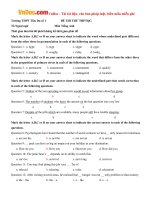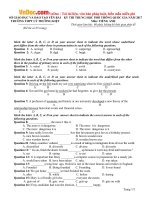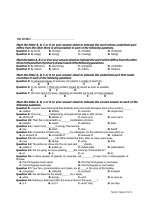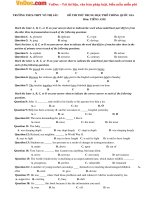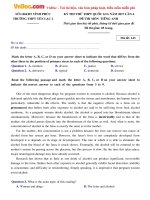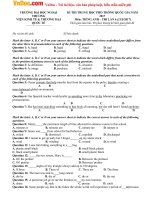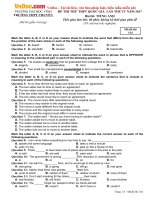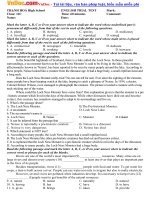Đề thi thử THPT Quốc gia năm 2017 môn Tiếng Anh trường THPT chuyên Khoa học tự nhiên - ĐHQG Hà Nội (Lần 1) có đáp án
Bạn đang xem bản rút gọn của tài liệu. Xem và tải ngay bản đầy đủ của tài liệu tại đây (293.08 KB, 8 trang )
VnDoc - Tải tài liệu, văn bản pháp luật, biểu mẫu miễn phí
ĐẠI HỌC KHOA HỌC TỰ
NHIÊN
TRƯỜNG THPT CHUYÊN KHTN
KỲ THI THỰC HÀNH THQG 2016-2017
MÔN THI: TIẾNG ANH
Thời gian làm bài: 60 phút, không kể thời gian phát đề
MÃ ĐỀ: 162
Đề thi gồm 05 trang
Các chỉ dẫn bằng tiếng Anh
Bài thi gồm 50 câu hỏi trắc nghiệm
Mark the letter A, B, C, or D on your answer sheet to indicate the underlined part that needs
correction in each of the following questons.
Question 1. United States is aimed at develop friendly relations among nations based on respect for
A
B
the principle of
C
equal rights and self-determination of peoples.
D
Question 2. All members shall give the United Nations every assistance in any action it does in
A
B
C
accordance with
the present Charter.
D
Question 3. Cultural diversity is important because most countries, workplaces, and schools
A
increasingly consist of
B
various culture, racial, and ethnic groups.
C
D
Mark the letter A, B, C, or D on your answer sheet to indicate the word whose underlined pert
differs from the other three in pronuciation in each of the following questions.
Question A. rhinoceros
B. biologist
C. reserve
D. digest
4.
Question A. form
B. schortcoming
C. chore
D. sector
5.
Mark the letter A, B, C, or D on your answer sheet to indicate the correct answer to each of the
following questions.
Question 6. The atmosphere at the meeting was very ______ and everyone was on first name terms.
A. formal
B. informal
C. formality
D. informality
Question 7. “Mark enjoys having fun by causing trouble. He’s very ______ boy.”
A. strong-willed
B. mischievous
C. obedient
D. well-behaved
Question 8. Many young people nowadays are prepared to _____ getting married to pursue their
professional careers.
VnDoc - Tải tài liệu, văn bản pháp luật, biểu mẫu miễn phí
A. satisfy
B. sacrifice
C. prefer
D. confide
Question 9. My boss’s plane _____ at 10:15 tomorrow morning, but I cannot pick him up.
A. arrives
B. is arriving
C. will be arrriving D. arrived
Question 10. Jack asked Jil ______ interested in any kinds of sports.
A. if she were
B. if were she
C. if was she
D. if she was
Question 11. Whenever problems ______, we discuss frankly and find solutions quickly.
A. make up
B. come up
C. put up
D. turn up
Question 12. Children should be taught that they have to _____ everything after they use it.
A. put away
B. pick off
C. collect up
D. catch on
Question 13. Vietnamese parents normally do not let their children make a decision ______ their
own future career.
A. in
B. of
C. on
D. for
Question 14. The police have just found the man and his car ______ were swept away during the
heavy storm last week.
A. that
B. which
C. whose
D. when
Question 15. ______, the more terrible the terrorism will become.
A. The more weapons are powerful
C. The more powerful weapons are
B. The weapons more powerful are
D. Weapons are the more powerful
Question 16. We are concerned with the problem of energy resources _____ we must also think of
our environment.
A. despite
B. though
C. however
D. but
Question 17. When finding a new house, parents should ______ all the conditions for their children’s
education and entertainment.
A. take into account B. make calculations C. get a measure of D. put into effect
of
Mark the letter A, B, C, or D on your answer sheet to indicate the most suitable response to
complete each of the following exchanges.
Question 18. Two friends Diana and Anne are talking about their upcoming exams.
- Diana: “Our midterm exams will start next Tuesday, are you ready?”
- Anne: “______”
A. I’m half ready.
B. God save you.
C. Thank you so D. Don’t mention it!
much.
Question 19. Mary is talking to her professor in his office.
- Mary: “Can you tell me how to find material for my science report, professor?”
- Professor: “______”
A. I like it that you understand.
B. Try your best, Mary.
C. You can borrow books from the library. D. You mean the podcasts from other
students?
Mark the letter A, B, C, or D on your answer sheet to indicate the word that differs from the other
three in the position of primary stress in each of the following questions.
Question
A. maximum
B. vacancy
C. terrorist
D. investment
20.
Question
A. vertical
B. contractual
C. domestic
D. outstanding
VnDoc - Tải tài liệu, văn bản pháp luật, biểu mẫu miễn phí
21.
Mark the letter A, B, C, or D on your answer sheet to indicate the word(s) OPPOSITE in meaning
to the underlined word(s) in each of the following questions.
Question 22. Language teaching in the United States is based on the idea that the goal of language
acquisition is communicative competence.
A. not good at socializing
C. unable to understand
B. excellent in orating in front of others
D. incapable of working with words
Question 23. This new washing machine is not a patch on our old one. These clothes are still dirty.
A. to be expensive
B. to be strage
C. to be broken
D. to be better
Mark the letter A, B, C, or D on your answer sheet to indicate the word(s) CLOSEST in meaning to
the underlined word(s) in each of the following questions.
Question 24. Today, American English is particularly influential, due to the USA’s dominance of
cinema, television, popular music, trade and teachnology (including the Internet).
A.
complete B.overwhelming
C. complete control D. profound effect
mastery
superiority
Question 25. Students’ motivation for learning a language increases when they see connections
between what they do in the classrooms and what they hope to do with the language in the future.
A. the reason for which someone does something
B. the actions that someone takes to deal with something
C. the eagerness that someone has to do something
D. the excitement with which one is filled when doing something.
Mark the letter A, B, C, or D on your answer sheet to indicate the sentence that is closest in
meaning to each of the following questions.
Question 26. “What are you going to do with such a long list of books, Dane?” asked Sarah
A. Sarah was curious why Dane had such a long list of books.
B. Sarah asked Dane what he was going to do with such a long list of books.
C. Sarah could not understand why dane was borrowing such a long list of books.
D. Sarah warned Dane not to borrow such a long list of books.
Question 27. “Are you going to the cinema with us tonight, Susan ?” asked her friends
A. Susan’s friends asked her whether she went to the cinema with them that night.
B. Susan’s friends asked her if she was going to the cinema with them that night.
C. Susan’s friends would like to invite her to go to the cinema with them that night.
D. Susan’s friends would rather her went to the cinema with them that night.
Question 28. The Internet has enabled most people to get contact in a matter of moments.
A. Most people have been able to get in contact by the Internet in a matter of moments.
B. Most people have got in contact as enabled in a matter of moments by the Internet.
C. On the Internet, most people are able to get in contact in a matter of moments.
D. On the Internet, most people can find their contacts in a matter of moments.
Read the following passage and mark the letter A, B, C, or D on your answer sheet to indicate the
correct word or phrase that best fits each of the numbered blanks from 29 to 33.
VnDoc - Tải tài liệu, văn bản pháp luật, biểu mẫu miễn phí
Tim Samaras is a storm chaser. His job is to find tornadoes and follow them. When he gets close
to a tornado, he puts a special tool (29) ______ a turtle probe on the ground. This tool measures
things like a twister’s temperature. Humidity, and wind speed. With this information, Samaras can
learn what causes tornadoes to develop. If meteorilogists understand this, they can warn people (30)
_____ twisters sooner and save lives.
How does Samaras hunt tornadoes? It’s not easy. First, he has to find one. Tornadoes are too
small to see using weather satellites. So Samaras can’t rely on these tools to find a twister. (31)
______, he waits for tornadoes to develop.
Once Samaras sees a tornado, the chase begins. But a tornado is hard to follow. Some tornadoes
change (32) _____ several times – for example, moving east and then west and then east again. When
Samaras finally gets near a tornado, her puts the turtle probe on the ground. Being this close to a
twister is (33) ______. He must get away quickly.
(Source: Reading Explorer)
Question
A. called
B. known
C. made
D. meant
29.
Question
A. with
B. about
C. at
D. for
30.
Question
A. Rather
B. Still
C. Instead
D. Yet
31.
Question
A. progression
B. movement
C. dimension
D. direction
32.
Question
A. terrify
B. terrifying
C. terrified
D. terrifies
33.
Read the following passage and mark the letter A, B, C, or D on your answer sheet to indicate the
correct answer to each of the questions from 34 to 40.
One of the highest honors for journalists, writers, and musical composers in the Pulitzer Prize.
First awarded in 1917, the Pulitzer Prize has been won by Emest Hemingway, Harper Lee, John F.
Kennedy, and Rodgers and Hammerstein, among others. As with many famous awards, this prize was
named after its founder, Joseph Pulitzer.
Joseph Pulitzer’s story, like that of many immigrants to the United States, is one of hardship,
hard work, and triumph. Born in Hungary, Joseph Pulitzer moved to the United States in 1864. He
wanted to be a reporter, but he started his American life by fighting in the American Civil War. After
the war, Pulitzer worked for the German – language newspaper, the Westliche Post. His skills as a
reporter were wonderful, and he soon became a partial owner of the paper.
In 1878, Pulitzer was able to start a newspaper of his own. Right from the first edition, the
newspaper took a controversial approach to news. Pulitzer wanted to appeal to the average reader, so
he produced exciting stories of scandal and intrigue. Such an approach is commonplace today, but in
Putlizer’s time it was new and different. The approach led to the discovery of many instances of
corruption by influential people. Pulitzer’s paper became very famous and is still produced today.
The success of Joseph Pulitzer’s newspaper made him a very wealthy man, so he wanted to give
something back to his profession. Throughout his later years, he worked to establish university
programs for the teaching of journalism, and he funded numerous scholarships to assist journalism
students. Finally, he wanted to leave a legacy that would encourage writers to remember the
VnDoc - Tải tài liệu, văn bản pháp luật, biểu mẫu miễn phí
importance of quality. On his death, he gave two milllion dollars to Columbia University so they
could award prizes to great writers.
Question 34. Why does the writer mention “John F. Kennedy” in line 3?
A. He was one of the inventors of the famous awards.
B. He was one of the winners of the Pulitzer Prize.
C. He was one of the people who selected the Pulitzer winners.
D. He was in one of the scandals reported on by Joseph Pulitzer.
Question 35. According to the reading passage, why did Joseph Pulitzer invent the Pulitzer Prize?
A. to encourage people to remember his name and success.
B. to encourage writers to remember the importance of quality.
C. to encourage journalism students to achieve their goals.
D. to encourage people to appreciate the work of the Pulitzer winners.
Question 36. The word “partial” in the passage is closest in meaning to ______.
A. in part only
B. brand new
C. one and only
D. very important
Question 37. According to the reading passage, who receives the Pulitzer Prize?
A. Columbia University graduates.
B. journalism students.
C. noted writers and composers.
D. most newspaper reporters.
Question 38. According to the reading nespaper, how did Joseph Pulitzer appeal to the average
reader?
A. He wrote about famous writers of journalism and literature.
B. He wrote stories about the war.
C. He produced his own newspaper.
D. He produced exciting stories of scandal and intrigue.
Question 39. Which sentence about Joseph Pulitzer is true according to the reading passage?
A. He received a scholarship when he was a university student.
B. He was rich even when he was young.
C. He was a reporter during the American Civil War.
D. He immigrated to the United States from Hungary.
Question 40. Which sentence about the Pulitzer Prize is NOT true according to the reading passage?
A. Joseph Pulitzer was the first writer to win the prize in 1917.
B. Winning the prize is the highlight of a writer’s career.
C. Joseph Pulitzer left money to award to the prizewinners.
D. Receiving the prize is one of the highest honors of writers.
Mark the letter A, B, C, or D to indicate the sentence that best combines each pair of sentences in
the following questions.
Question 41. The teacher has done his best to help all students. However, none of them made any
effort on their part.
A. The teacher has done his best to help all students, then, none of them made any effort on their part.
B. Although the teacher has done his best to help all students, none of them made any effort on their
part.
C. Because the teacher has done his best to help all students, none of them made any effort on their
part.
VnDoc - Tải tài liệu, văn bản pháp luật, biểu mẫu miễn phí
D. If the teacher has done his best to help all students, none of them made any effort on their part.
Question 42. “Finish your work. And then you can go home.”
A. “You can’t go home until you finish your work.”
B. “You finish your work to go home as early as you can.”
C. “When you go home, finish your work then.”
D. “Because you have finished your work, you can go home.”
Read the following passage and mark the letter A, B, C, or D on your answer sheet to indicate the
correct answer to each of the questions from 43 to 50.
Clara Barton became known as “The Angel of the Battlefield” during the American Civial War.
Born in Oxford, Massachusetts in 1821, Clara Barton’s interest in helping soldiers on the battlefield
began when she was told army stories from her father. Another event that influenced her decision to
help soldiers was an accident her brother had. His injuries were cared for by Barton for 2 years. At
the time, she was only 11 years old. Barton began teaching school at the age of 15. She taught for 18
years before she moved to Washington, D.C. in 1854.
The civil war broke out 6 years later. Immediately, Barton started was service by helping the
soldiers with their needs. At the battle of Bull Run, Clara Barton received permission from the
government to take care of the sick and hurt. Barton did this with great empathy and kindness. She
acknowledged each soldier as a person. Her endurance and courage on the battlefield were admired
by many. When the war ended in 1865, she used 4 years of her life to assist the government in
searching for soldiers who were missing during the war.
The search for missing soldiers and years of hard work made her feeble physically. In 1869, her
doctors recommended a trip to Europe for a rest. Whle she was on vacation, she became involved
with the International Red Cross, an organization set up by the Geneva Convention in 1864. Clara
Barton realized that the red Cross would be a big help to the United States. After she returned to the
United States, she worked very hard to create an American red Cross. She talked to government
leaders and let American people know about the Red Cross. In 1881, the Notional Society of the Red
Cross was finally established with its headquarters in Washington, D.C. Clara Barton managed its
activities for 23 years.
Barton never let her age stop her from helping people. At the age of 79, she helped flood victims
in Galveston, Texas. Barton finally resigned from the Red Cross in 1904. She was 92 years old and
had truly earned her titled “The Angel of the Battlefield”.
Question 43. According to paragraph 1, which of the following is true of the young Clara Barton?
A. She helped her father when he was a soldier.
B. She suffered from an accident when she was 11.
C. She helped her brother who hurt in an accident.
D. She made a decision to live with her brother for 2 years.
Question 44. The phrase broke out in paragraph 2 is closest in meaning to
A. extended
B. broke down
C. closed
D. began
Question 45. The word this in paragraph 2 refers to
A. recognized each soldier as a person
B. cooked for soldiers
C. took care of the sick and hurt
VnDoc - Tải tài liệu, văn bản pháp luật, biểu mẫu miễn phí
D. received permission
Question 46. The word acknowledged in paragraph 2 could best be replaced by
A. nursed
B. recognized
C. pleaded
D. believed
Question 47. What can be inferred about the government?
A. It did not always agree with Clara Barton.
B. It did not have the money to hep Clara Barton.
C. It showed Clara Barton great empathy and kindness.
D. It had respect for Clara Barton.
Question 48. What does the author mention about the American Red Cross?
A. It was disapproved again and again by the Geneva Convention.
B. Barton tried to have it set up in America.
C. The American people were not interested in the Red Cross.
D. It was first established in the United States.
Question 49. What is the main idea of the passage?
A. Clara Barton helped wounded soldiers and she was the founder of the Red Cross.
B. Clara Barton was a kind and strong woman who helped people in need.
C. Clara Barton became a nurse during the American Civil War.
D. Clara Barton worked for disaster victims until she was old.
Question 50. What can be the best title of the reading passage?
A. The angel of the Battlefield
B. The American Red Cross
C. The American Civil War
D. The International Red Cross
________THE END_________
VnDoc - Tải tài liệu, văn bản pháp luật, biểu mẫu miễn phí
ĐẠI HỌC KHOA HỌC TỰ
NHIÊN
TRƯỜNG THPT CHUYÊN KHTN
KỲ THI THỰC HÀNH THQG 2016-2017
MÔN THI: TIẾNG ANH
Thời gian làm bài: 60 phút, không kể thời gian phát đề
MÃ ĐỀ: 162
Đề thi gồm 05 trang
ĐÁP ÁN
Question
Answer
Question
Answer
Question 1
A Question 26
B
Question 2
C Question 27
B
Question 3
C Question 28
A
Question 4
C Question 29
A
Question 5
D Question 30
B
Question 6
B Question 31
C
Question 7
B Question 32
D
Question 8
B Question 33
B
Question 9
A Question 34
B
Question 10
D Question 35
B
Question 11
B Question 36
A
Question 12
A Question 37
C
Question 13
C Question 38
D
Question 14
A Question 39
D
Question 15
C Question 40
A
Question 16
D Question 41
B
Question 17
A Question 42
A
Question 18
A Question 43
C
Question 19
C Question 44
D
Question 20
D Question 45
C
Question 21
A Question 46
B
Question 22
A Question 47
D
Question 23
D Question 48
B
Question 24
B Question 49
B
Question 25
A Question 50
A

